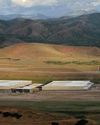Prøve GULL - Gratis
Day the newspapers died
The Light
|Issue 37: September 2023
Reporting on 9/11 saw collapse in trust of mainstream news

THEY'RE still there, on supermarket shelves, in petrol stations and convenience shops. But the bundles are much smaller now.
Some retailers stock a limited selection, or take a single copy of The Guardian, with only the Daily Mail and Sun making the distribution worthwhile. For how much longer can the daily newspaper, that faded icon of British social life, survive?
The terminal decline began two decades ago, on September 11, 2001. The attack on the World Trade Center in New York surely surpassed other historical landmarks in our collective memory, such as the death of Princess Diana, the breach of the Berlin Wall, or even the seminal Sixties events of the moon landing and assassination of JFK.
At the turn of the millennium, our national newspapers were competing in a boisterous market. The Saturday edition of the Daily Telegraph was so thick with supplements that you needed a wheelbarrow to carry it home. Back then, the Telegraph sold a million daily, the Mail two million and the Sun over three million.
My local railway station at Carshalton had a magazine stall, and the busy rush-hour platform was lined with commuters reading their chosen version of the news. Many of these same people also bought the Evening Standard for the journey home.
Newsagents were threatened by the free Metro paper, which was available at every railway and underground station. For a while, the stall owner moved the Metro stack out of sight, to protect his livelihood, but eventually his business succumbed.
Why was 9/11 so key to the demise of the newspaper? The wider context is that the internet transformed society, shifting us from the analogue to the digital world.
Denne historien er fra Issue 37: September 2023-utgaven av The Light.
Abonner på Magzter GOLD for å få tilgang til tusenvis av kuraterte premiumhistorier og over 9000 magasiner og aviser.
Allerede abonnent? Logg på
FLERE HISTORIER FRA The Light

The Light
Why do we trust the political class?
IT began, as most national embarrassments do, with good intentions and a graph. Gordon Brown, that high priest of responsible arithmetic, decided around the turn of the millennium that Britain owned too much shiny metal and not enough moral superiority.
4 mins
Issue 63, 2025

The Light
Dilemma of conflicting 'rights'
No community should violate the freedoms of a minority
4 mins
Issue 63, 2025

The Light
The ritual execution of Princess Diana
ON 31st August 1997, Princess Diana died in a car crash in Paris's Pont de l'Alma tunnel. Official accounts are contradictory and simple research points to a long-running conspiracy.
4 mins
Issue 63, 2025

The Light
Sugar industry's fluoride 'solution'
Researchers tasked with sweetening tooth decay problem
4 mins
Issue 63, 2025

The Light
Trump's colonial plan
U.S. takes Gaza, and Israel takes the West Bank
5 mins
Issue 63, 2025

The Light
All that glitters is not gold
Precious metal value boosted by economic turmoil
3 mins
Issue 63, 2025

The Light
End of the road is serfdom
Who controls the public mind? Economist warned of path to totalitarian oppression
4 mins
Issue 63, 2025

The Light
Pushback against vast data centres
Communities in U.S. rally to repel Big Tech planning bids
4 mins
Issue 63, 2025

The Light
Water: Much more than we think
Gel-like state could be key to health and consciousness
2 mins
Issue 63, 2025
The Light
Discover the formidable legal shields safeguarding your rights
The UK constitution isn't a single book; it's a living arsenal forged across centuries in charters, conventions, and court rulings.
2 mins
Issue 63, 2025
Translate
Change font size

